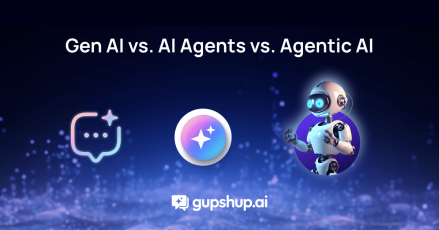A Comprehensive Guide to Conversational AI in Healthcare

Recent research revealed that 50-70% of call center activity is related to health benefits. By itself, this fact is not problematic. But considering that each such interaction typically costs $5-$15 (sometimes more) and also results in long wait times and unhappy customers, healthcare organizations have a serious problem on their hands.
In the U.S. and elsewhere, healthcare is fast evolving into a more consumer-driven industry. Today’s customers demand better plans, more personalized care, low-cost solutions, and high-quality, accurate information from the healthcare providers they interact with. These organizations need better ways to provide high-quality consumer experiences while lowering their costs to keep up with these demands.
The key to meeting these goals is technology, specifically conversational AI in healthcare.
According to Accenture, AI in healthcare can save the U.S. healthcare economy a whopping $150 billion annually by 2026. By augmenting human activities and capabilities, conversational AI for healthcare can unleash immense improvements in healthcare quality, accessibility, and costs. This is why Accenture expects that the market for AI technology in healthcare will grow from $600 million in 2014 to over $6.6 billion by 2021. This represents an explosive CAGR of 40%.
This blog for conversational AI in healthcare explores why Conversational AI is such an exciting new development in the healthcare industry.
- What are some key trends driving the growth of Artificial Intelligence in healthcare?
- What are the benefits of conversational AI in the healthcare industry?
- What are the most popular use cases?
Keep reading this detailed resource to learn all this and more.
Conversational AI in Healthcare with Chatbots and Virtual Assistants
Conversational AI in the medical field is helping to bring about much-needed digital transformation with potential benefits for everyone across the healthcare value chain. This includes consumers, providers, administrators, marketers, and more. By allowing users to interact with providers via voice or text-based chatbots and virtual assistants, Conversational AI technology is helping to streamline and automate many different processes.
In simple terms, Conversational AI refers to solutions like chatbots and virtual assistants that employ AI techniques like Natural Language Processing (NLP), voice technology, and Machine Learning (ML) to automate user interactions. These tools go beyond simple rule-based answers to analyze human speech (or text), understand their intent and meaning, and generate appropriate responses. Thus, “conversational” truly means having conversations that feel entirely natural, human-like, and comfortable to users.
AI in healthcare encompasses tools and machines that can sense and comprehend human inputs, act according to these inputs and their context, and even learn over time to improve their ability to feel, understand and operate. Moreover, unlike legacy AI algorithms and tools that only complement human activities and can’t function independently, Conversational AI tools can work independently to augment human activities (e.g., call center interactions).
To be truly useful, Conversational AI agents like chatbots must have these qualities:
- Knowledgeable: The bot should fetch the correct information and present it to the user in an accessible, easy-to-digest format.
- Empathetic: Conversational chatbots should understand the user’s query and its underlying intent and context to present the right solutions with minimal hassle or wait times.
- Engaging: Robotic, overly real conversations are a strict no-no in healthcare. Instead, the chatbot should converse with users in a warm, human-like manner that makes them feel important and cared for.
Key Growth Drivers of AI In Healthcare
Today’s consumers are taking a more active and authoritative role in their healthcare journeys. This is especially true of highly developed healthcare markets such as the U.S., where federal mandates like the new CMS rules proposed in December 2020 improve patient access to health information and thus empower them to make better decisions about their health.
Following such changes, healthcare consumers (patients and others) demand better, more relevant information that’s available quickly and in a format they can easily consume. The healthcare industry is burdened with a staff shortage, particularly in the post-COVID era, and thus struggles to provide quality care and information. Here’s where Conversational AI can step in to fill such gaps. Conversational AI in healthcare offers a user-friendly, automated means of sharing important information with consumers at a low cost and scale.
Other dynamics also bode well for the growth of Conversational AI in healthcare. Consumers increasingly prefer digital channels like SMS, live chat, and chatbots over traditional voice interactions to interact with healthcare providers and organizations. This creates a broad space for an increasing number of Conversational AI applications and use cases. Moreover, such platforms also offer more privacy and a record of interactions – two benefits that users appreciate and even prefer.
Another driver of the demand for conversational AI healthcare applications is the COVID-19 pandemic, specifically stay-at-home measures, social distancing norms, and the increasing pivot towards deferred care. Due to pandemic-related concerns, 41% of U.S. adults delayed medical care. Instead, they turned to digital care solutions like telehealth and chatbots to alleviate their problems.
The Benefits of AI in Healthcare: Chatbots and Other Applications
Chatbots and Virtual Assistants
Conversational AI-driven chatbots and virtual assistants are two remarkable applications of AI in the medical field that bring numerous benefits for both consumers and providers.
Chatbots can respond to all commonly asked questions and thus take the burden off call centers and their human agents. Agents are no longer distracted by repetitive, low-value queries. Instead, they can focus on higher-value tasks and situations where automation cannot work, and their unique human capabilities are required.
AI-driven chatbots leverage Natural Language Processing (NLP), ML, contextual awareness, multi-intent understanding, and other functionalities to address the new complexities of modern users’ healthcare journeys. Such lower-cost, self-service channels can also understand user intent, ask relevant clarification questions, and provide answers in the shortest possible time. They can carry on independent conversations with users and quickly provide the information they need in a user-friendly, low-friction format. These conversations can even be asynchronous, so users can leave and return to the conversation at some other time. This flexibility and convenience are not possible with human-based voice interactions.
Moreover, Conversational AI solutions also continuously learn, adapt, and optimize user experiences over multiple interactions. Virtual assistants can even connect Net Promoter Scores (NPS) to user interactions to garner feedback that can be used to enhance customer experiences further.
Higher call volumes are the new reality in the post-COVID era. And the healthcare industry is not exempt from this fact. AI-based chatbots can not only handle larger call volumes, but they can also provide a more consistent user experience with every interaction.
Other AI Applications
Other AI-based applications can also perform administrative and clinical healthcare functions. According to Accenture, the top 10 such applications of Artificial Intelligence in medicine are:
- Robot-Assisted Surgery
- Virtual Nursing Assistants
- Administrative Workflow Assistance
- Fraud Detection
- Dosage Error Reduction
- Connected Machines
- Clinical Trial Participant Identifier
- Preliminary Diagnosis
- Automated Image Diagnosis
- Cybersecurity
These applications already create value to the tune of billions of dollars either in cost savings or increased revenues. Furthermore, as these applications continue to improve their ability to learn and act, they will generate even more improvements in precision, efficiency, cost savings, and better healthcare outcomes.
Conversational AI Platforms for Healthcare
A conversational AI platform like Gupshup enables healthcare organizations to build and maintain their chatbots and virtual assistants. It comes with a graphical user interface (GUI) that can deploy machine learning models and algorithms to improve the chatbot.
When a user asks the chatbot a question, it goes through the NLP engine for processing and response generation. If no response is found, the chatbot falls back on FAQs to provide an answer. If a reply is unavailable, the bot seamlessly transfers the query to a live agent who can now interact with the customer and continue the conversation without affecting their experience.
The platform provides the flexibility to update dialogues, conversational flows, and responses as required. The GUI can also analyze and process the necessary data for the chatbot to function as it should and deliver actionable business insights based on bot data analytics. The underlying ML technology means that the chatbot undergoes consistent “training” to become smarter and more intelligent over time.
Conversational AI in Healthcare: 7 Important Use Cases
Artificial Intelligence in the medical field already has numerous applications that are changing the face of healthcare worldwide.

Conversational AI in Healthcare with Gupshup
AI-driven chatbots and other applications are helping to usher in a digital revolution in the healthcare industry. In particular, conversational AI in healthcare is transforming patient care, support, and reducing the burden for healthcare providers. From providing information and scheduling to diagnosis and engagement, AI in healthcare revolutionizes patient experiences and improves outcomes for both consumers and providers.
Creating a conversational AI application such as a chatbot or voice bot with the right Conversational AI platform is easy. Gupshup’s bot-builder platform is ideal for healthcare institutions and providers looking to leverage the power of Artificial Intelligence and Machine Learning to deliver better and more timely care that improves the health and lives of their patients.
Explore how conversational AI is revolutionizing healthcare with these insightful resources:




